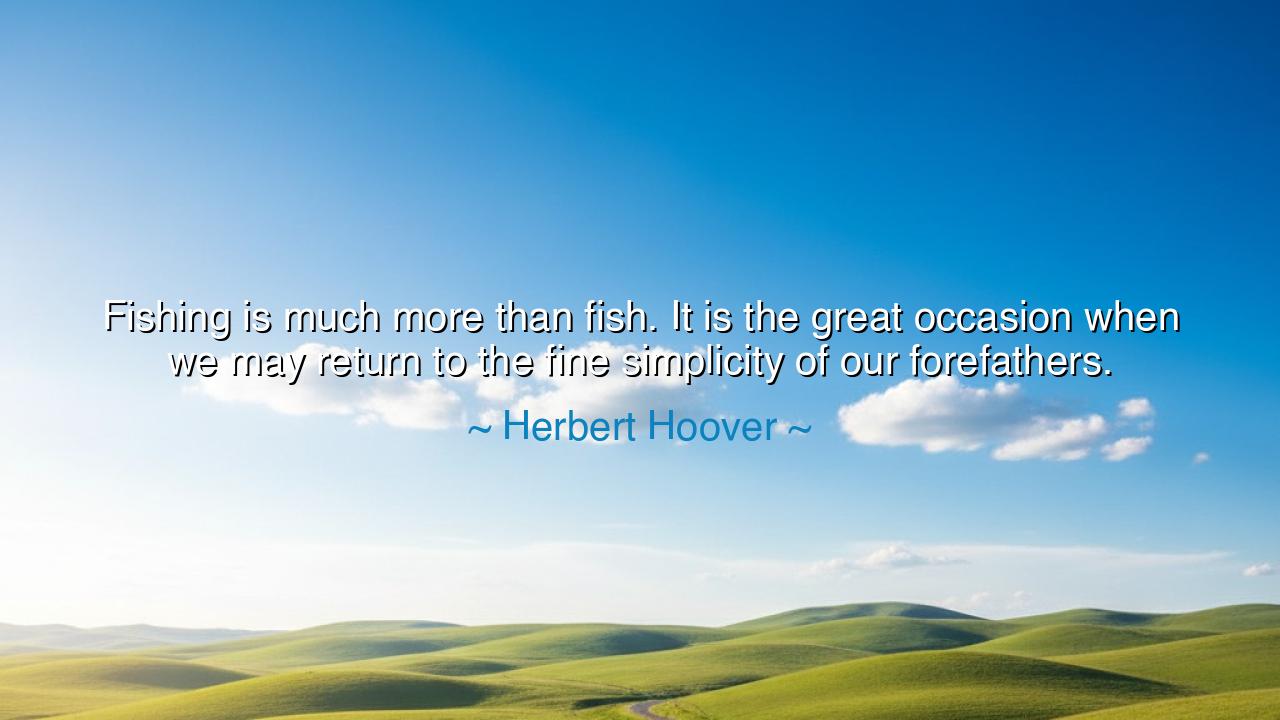
Fishing is much more than fish. It is the great occasion when we
Fishing is much more than fish. It is the great occasion when we may return to the fine simplicity of our forefathers.






The statesman Herbert Hoover, remembered by history as both President and humanitarian, once said with quiet reverence: “Fishing is much more than fish. It is the great occasion when we may return to the fine simplicity of our forefathers.” In these few, tranquil words, he captured a truth deeper than the water itself — a truth about the soul’s need for simplicity, about man’s longing to touch again the rhythm of the earth and the calm wisdom of the past. For Hoover, who lived through the storms of industry and war, the act of fishing was not sport, but sanctuary — a return to the clarity that modern life so often clouds.
In this saying, fishing becomes a symbol, not merely a pastime. To cast a line into the stillness of a river is to silence the noise of the age and listen again to what is eternal. The modern man, surrounded by machines and ambition, loses the art of patience, of waiting, of stillness. But the fisherman — that ancient figure who stands between sky and water — learns again the virtues of humility, attentiveness, and peace. The fish, as Hoover reminds us, are but the smallest part of the reward. The greater catch lies in the return to simplicity, to the primal peace our forefathers knew when they lived by the sun and the seasons, their hands guided by the elements, their hearts content in honest labor.
When Hoover spoke these words, he was reflecting not only on the beauty of nature but also on the moral discipline that arises from it. He saw that modern civilization, for all its progress, had drawn mankind away from the earth’s wisdom. Fishing, in his view, was a ritual of remembrance — a way to recall that man was once a creature of rivers and wind, whose life was woven into the fabric of the natural world. To fish is to remember that food once came from the effort of one’s own hands, that patience and gratitude were once daily virtues, and that man’s first teacher was the quiet voice of nature.
Consider, for a moment, the story of Izaak Walton, the 17th-century author of The Compleat Angler. Walton lived during a time of political turmoil in England, yet he sought solace not in the courts or cities, but in the countryside, by the riverside. He wrote that fishing “brings us to contentedness,” that it teaches a man to meditate on life and death, and to find joy in the smallest things. Like Hoover centuries later, Walton understood that the stream restores what the world takes away — patience for hurry, peace for anxiety, wonder for ambition. Both men, separated by time, found in the simple act of waiting upon a fish the same eternal lesson: that man, when still, rediscovers himself.
There is also a spiritual resonance in Hoover’s words. The “fine simplicity of our forefathers” is not merely a reference to an earlier age, but to a purer state of being — when life was guided by gratitude, not greed; by sufficiency, not excess. To fish is to live again by those ancient virtues. It is to exchange the hurried pace of commerce for the eternal patience of water. In that stillness, one feels again the pulse of creation — the whisper of the divine in the rippling current, the echo of one’s ancestors in the rhythm of the cast. The fisherman, in truth, becomes a philosopher of the stream — meditating not on profit or power, but on the balance of life itself.
Hoover’s insight reaches even beyond fishing. He was speaking, in essence, of the need for simplicity in every life. Whether one holds a rod, a plow, or a pen, there must be moments when the soul withdraws from the noise of progress and returns to the calm strength of origin. Every man and woman must find their “stream” — a place, an act, a stillness — that restores what the world erodes. Without such returns, civilization grows clever but hollow, efficient but lost. Simplicity is not retreat; it is renewal — the cleansing of the heart so it may face the world again with clarity.
So let the lesson of Hoover’s words flow into your life like a clear river. Seek the simplicity of your forefathers, not in nostalgia, but in spirit — in patience, gratitude, and the reverence for what is real. Step away from the clamor when you can; let the stillness of water teach you again how to breathe. Remember that greatness is not found in the abundance of possessions, but in the purity of purpose. For when a man learns to sit quietly by the river — whether he catches fish or not — he has already caught something far greater: the peace that comes from remembering who he truly is.






AAdministratorAdministrator
Welcome, honored guests. Please leave a comment, we will respond soon